Peter MALONE
Saturday, 18 September 2021 19:32
Lois Gibbs and the Love Canal
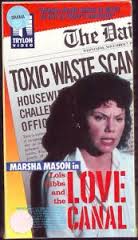
LOIS GIBBS AND THE LOVE CANAL
US, 1982, 100 minutes, Colour.
Marsha Mason, Bob Gunton, Louise Latham.
Directed by Glen Jordan.
Lois Gibbs and the Love Canal is a film about the environment, chemical dumping, the consequences for health. It is the story of a campaign by ordinary citizens of Niagara Falls and of a mother who was propelled into leadership in the campaign.
The film is based on actual events occurring between 1978 and '80. Lois Gibbs was the mother of children in Niagara Falls who comes across articles about the dumping of chemicals. She led a campaign in which President Carter finally intervened to give money to 700 families in the city to move away from homes which were in the dangerous area. Marsha Mason is energetic in the central role. Stage star Robert Gunton is her husband. The film was directed by Glenn Jordan, veteran director of many telemovies including Les Miserable and The Women's Room.
1.Interesting story? Based on characters and actual events? Environmental causes?
2.The city of Niagara Falls, homes, the picturing of the heavy industry in the city? The late '70s and early '80s?
3.The title and its focus, Lois Gibbs as an ordinary citizen? The Love Canal and the various canals in the American cities? Underground streams? Carrying toxic waste?
4.Niagara Falls, the homes, the 99th Street school? Industry, the burying of toxic waste in the '50s? Leakage? Local responsibility? Government responsibility? The exercise of responsibility, avoiding it?
5.Lois Gibbs and her family, love for her children, relationship with her husband? Her concern about her children's health? Her friends? Hearing about the articles? Meeting the author, the scientist? Her questions, the challenge by the scientist, the support of her family? Her son's illness? Wanting to move him from the school? The reaction of the education officers?
6.Lois and her campaign, her nervousness, her practising her speech, going to people's doors, meeting her school friend and enlisting her support? Signatures? Going to Albany? The reaction to the report, the questions, being evicted, on television, returning home, her speech, elected as the president of the campaign? The effect on her personally, her lack of education, discovering her own intelligence and skills? Working with people? The effectiveness of the campaign? The people moving out, into the motels, the long month of trying to live in motels? Officials visiting and her holding them? Phone calls to the White House? Television interviews? The repercussions for herself and her health? Her relationship with Harry, love and support, his moving away, trying to support her, going back to the old home, the breakaway - and the final information about her divorce? Her devotion to the cause, the break-up of her marriage?
7.The supporters - the women, wives, mothers? The deaths and illnesses? The meetings, the rallies, television? Mail-outs? The organisation of the campaign?
8.Lois's family: Harry, a good man, his work, support of his wife? Bewildered, alienated, life in the motels, his going back to the house? Separation? The children and their illnesses, the fear of leukemia, visits to the hospital?
9.The importance of the case, highlighting the dangers from past decades? The extraordinary illnesses and dangers in Niagara Falls? The building of the school on the ground which was poisoned? The consequences for families, their fears, dependence on companies for houses? Life in the motels and the break-up of marriages? Family tensions? The slow response of government?
10.The popularity of this kind of theme during the '80s and '90s - and world concern about the environment?
Published in Movie Reviews
Published in
Movie Reviews
Tagged under
Saturday, 18 September 2021 19:32
Locket, The
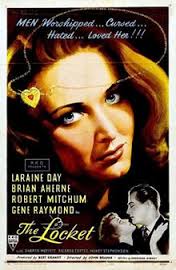
THE LOCKET
US, 1946, 85 minutes, Black and white.
Laraine Day, Robert Mitchum, Brian Aherne, Gene Raymond, Ricardo Cortez.
Directed by John Brahm.
The Locket is a very interesting example of the film noir of the mid-'40s. In the aftermath of World War Two, there were many thrillers with downbeat themes and endings. The bleakness of the war spirit and the abuse and corruption seemed to give some grounding for this kind of thriller.
Laraine Day is charming as the woman who turns out to be the femme fatale, trying to destroy the lives of the men with whom she comes in contact. These men include Brian Aherne as a gentlemanly psychiatrist, Robert Mitchum in an early role as a rather unbelievable artist, Gene Raymond as her next husband.
The film was directed by John Brahm (Hangover Square, The Brasher Doubloon). The screenplay is famous for being a series of flashbacks - flashbacks within flashbacks.
1.Interesting and entertaining thriller? 1946 film noir? The portrait of the femme fatale? Psychological drama?
2.Black and white photography, the mood of the film, the war years, the experience of the war? The significance of the flashbacks, the flashbacks within flashbacks? Dramatic effect? Musical score?
3.The title: the locket in itself, the motivation for Nancy's behaviour, her receiving the locket at her wedding? The clues? The changes in Nancy because of the locket?
4.The introduction: Nancy as charming, the marriage, Laraine Day's style? Her preparations to marry John? The welcome of the family? Harry Blair and his arrival, his warmth? His memories of his wife and the happy relationship? The flashbacks to Norman and explaining Nancy's relationship to him? Her work as secretary, attractive, the art class, the talk in the cafe, the parties, the attraction of the jewels, the proposal of marriage, the murder, her lies, the court investigation, Norman's relationship with her? Her denial of all this to Harry? Norman's death? The going back to Harry, going to England, the experience of the war and her work? At the Wyndhams' mansion? The jewels, her stealing? The return to London, the bombing? The confrontation with Harry? Her putting him in an institution? The complex portrait of Nancy?
5.Her telling Norman of the story when she was a girl: her friendship with Karen, her own mother and Karen's mother, being a servant, not allowed to go to the party, Karen's gift of the locket, Karen's mother making her return it, the interrogation and her bitterness, the finding of the locket in Karen's dress? The motivation, the bitterness and anger, the revenge? The full circle with her marrying John Willis, Mrs Willis giving her the locket as a present?
6.The wedding, the gift of the locket, triggering of memories, her walking down the staircase, the collapse?
7.The portrait of Norman, the artist, his work, the meeting with Nancy, falling in love, socialising, the parties, discovering her lies, the interrogations? Going to Harry Blair, argument? His suicide? The execution of the wrong man for her murder?
8.Harry and his skills as a psychiatrist, believing Nancy, not believing Norman? Going to England, the Wyndhams? His suspicions about the jewellery? The train ride and his regrets about his suspicions? The bombardment of the house, the finding of the jewellery? The confrontation and Nancy interning him in an institution?
9.Harry going to John, the explanation, John and his decisions?
10.Mrs Willis, her cruelty, her interrogations, the irony of the ending? The contrast with Nancy's caring mother?
11.The end, Nancy's future?
12.Thriller themes? The destructive woman? The victim men? The themes of madness, psychiatry?
Published in Movie Reviews
Published in
Movie Reviews
Tagged under
Saturday, 18 September 2021 19:32
Loaded

LOADED
UK, 1994, 95 minutes, Colour.
Thandie Newton, Catherine Mc Cormack, Oliver Milburn.
Directed by Anna Campion.
Loaded is a British- New Zealand co-production, written and directed by Anna Campion (sister of Jane Campion). It takes a conventional situation, a group of people at an isolated house. They interact, their are truth games. However, this is a group of 20-year-old-pluses and their aim in going to the house is to make their own video horror movie. This gives the opportunity for characterising the young men and women, their performances, their relationships, tragedy. However, issues of relationship and responsibility and selfishness are raised.
The film is well acted - although, for older audiences, the behaviour and attitudes of the young people could be very trying.
1.A portrait of young adults of the '90s? A New Zealand-UK co-production? Its universal relevance?
2.London settings, the road, the country house? The musical score?
3.The title and its references: loaded with drink and drugs, loaded with money, the video camera loaded?
4.The opening with Neil, in himself, music, his audio letters to his psychiatrist, the discussions with the psychiatrist and videoing the interviews? His replaying them? The theories about re-enacting one's own psyche in one's life?
5.The video loaded: the film, the dreams, the psychological power of the video? Neil and the memory of his brother's death (and willing it or not)? Lionel's death?
6.The trip down, the introduction to the group, arrival at the house, the criteria for selecting rooms, each character and their relationship with the other?
7.The preparation of the video film, the props, the story? Giles and his preoccupation with serial killers, the picture of Myra Hindley? The scenes and the gore? The filming, having fun, the retakes?
8.Interrelationships, friendships, sexual relationships? Neil and his love for Rose? Rose and her virginity? The attraction towards Lionel? The contact with Lionel, searching for the contact lens, his kiss, Lance seeing it and telling everybody, the dire results?
9.Lance and Charlotte and their relationship? Lionel and his coming late? The meals, the discussions? The decision to take the acid? The hallucinatory experiences? Their being loosened? Their talk, their behaviour, attitudes?
10.The trip to the town, Lionel on his bike, the reaction of the town kids and the violence? Lionel coming back on his bike, Neil accelerating? Intending to kill Lionel or not? The reactions, the fear, burying Lionel in the woods?
11.Questions of responsibility, their avoiding responsibility, their fears, selfishness? Especially Lance?
12.Neil and Rose, the discussion, Neil having to take responsibility, the sexual encounter with Rose? His going to the police?
13.The searching for the body and unable to find Lionel? The forest and its secrets? Their wondering whether everything was a hallucination? Rose and her love for Lionel's gentleness and thinking of him as rising from the dead? The final fast tracking through the forest - and the uncertainty of the future?
Published in Movie Reviews
Published in
Movie Reviews
Tagged under
Saturday, 18 September 2021 19:32
Longtime Companion
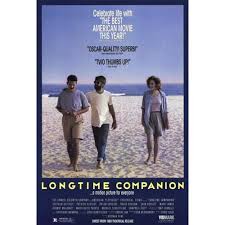
LONGTIME COMPANION
US, 1990, 100 minutes, Colour.
Stephen Caffrey, Patrick Cassidy, Bruce Davison, Dermot Mulroney, Mary Louise Parker, Michael Schoeffling, Robert Joy, Campbell Scott.
Directed by Norman Rene.
Longtime Companion is the first major American film concerning AIDS. Documentaries and even television features, such as John Erman's An Early Frost, tackled the subject - as well as many low-budget features (including New Zealand's very effective A Death In The Family).
While the film has a small budget, the producers were able to persuade some name actors to perform in the film, especially Bruce Davison, who won a number of awards for his supporting actor role.
The film was written by Craig Lucas and Norman Rene, producers and playwrights. It focuses on a group of New York men over a period of eight years, using the device of looking at a day in each year from 1981 to '89. The first day is the day that there was an announcement in the New York Times about the illness affecting homosexuals. As the years progress, partners become ill, need caring for, die. There is also a change in the men in terms of their relationships, lifestyles, concern for those suffering.
The film takes for granted the homosexual lifestyle, does not make any special pleading. Where the pleading comes is in the rather visionary ending which is presented with great fervour. The film is popular entertainment designed for the wide American audience, designed for a blend of insight and sympathy.
1.The`impact of the film? American acclaim? The first major American feature on AIDS (why the long delay)? For an American audience? Non-Americans?
2.The title, the indication of relationships, the euphemism for lover?
3.The New York settings and the New York State environment? City, homes, hospitals, beaches, television stations? Authentic atmosphere? Musical score?
4.The structure of the film: the single days from 1981 to`'89? The day of the news in the New York Times? Developments of relationships, work, illness? Deaths? Abilities and inabilities to cope? The impact of illness and death? Funeral services? The concert? The final vision?
5.AIDS and the '80s? Audience knowledge of AIDS, symptoms, the nature of the illness and its effect? The effect on the immune system? Audience experience or lack of experience? Phobias? Prejudices? Information - and popular scares about the communicability of the disease? The screenplay designed to give perspective to all of these questions?
6.The characters themselves and their talk about AIDS, the gay cancer, the initial fears, not believing that it would be fatal? The growing number of illnesses and death? Comparisons plague? The question of some kind of moral retribution? The discussions of AIDS in the '80s? Fears? Coming to terms with AIDS? The longing for medication and remedy?
7.Audience response to the gay culture of New York City? To homosexuals and their relationships? Empathy, judging the lifestyle? The film taking for granted the lifestyle and values?
8.The film as a blend of drama, romantic drama, comedy, intimate relationships, the touches of soap opera, tribute to victims, final appeal?
9.The background of the gay culture, the beach holidays, parties, the special world and relationships, situated within a 'normal' atmosphere? The soap opera and the introduction of gay characters - the sensation, audiences watching, the writer and his friends watching? The kiss?
10.Willie and his work at the gym, friendship with John, on the holiday, Fuzzy in the water, the attraction? The parties, talking? The beginning of the relationship? Lisa and the relationship and friendship? John's illness and his going to hospital, the pneumonia, the puzzle
Published in Movie Reviews
Published in
Movie Reviews
Tagged under
Saturday, 18 September 2021 19:32
Living End, The
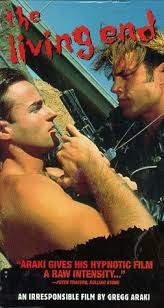
THE LIVING END
US, 1992, 92 minutes, Colour.
Craig Gilmore, Mark Dytri, Darcy Marta.
Directed by Gregg Araki.
The Living End is a small-budget American film written, produced and directed by Gregg Araki. He calls his film an irresponsible movie. It looks at two HIV-positive men from a gay sensibility. It looks at the gay culture of America in the '80s and '90s and the consequences of AIDS. It explores the theme of the freedom that HIV-infected men might have when there is no further danger to their health. It toys with the idea of suicide and links sex with death. It also resembles in framework the road movies and films like Thelma and Louise.
The film is designed for a gay audience, picturing gay behaviour and issues. However, despite the small budget and the experimental style of the film at times, it went on general release and found a wider audience.
1.Impact of the film? The director's calling it an irresponsible film? How responsible was it in terms of a presentation of the gay culture, people infected by HIV AIDS, the consequences of AIDS?
2.Araki and his work, cinematic skills, perspective? For the gay audience, non-gay audience?
3.The title, the ironies? Death? AIDS and the consequences? The theme of freedom to do one's own thing without restraint? The decision to end one's life when one wills? The resilience of human nature and the will to live?
4.Small budget, cinematic style, sequences as units with fade-outs? The serious tone, the comic tone? The road movies, Thelma and Louise? The spoof elements? Ironic characters and brief appearances, humorous episodes and exaggeration?
5.John, his work as a writer, movie buff, his past relationships, the blunt information that he had AIDS? The effect on him, on his sister? The bond with his sister and brother-in-law? The chance encounter with Luke, picking him up, taking him home, the growing relationship, the possibilities of freedom?
6.Luke, a hustler, using his sexual attractions, being picked up by the lesbians, their taunts, the gun, his warning about snakes - and the irony of the screams from the roadside? The pick-up, the spanking, the ironic humour of the wife coming in and shooting her husband, condemning this bisexuality in the '70s? The chance encounter with John?
7.Their relationship, emotional, sexual? The decision to go on the journey, the driving, the episodes, sexual attraction and behaviour? The discussions about freedom? Not welcome in San Francisco? John and his phone calls to his sister? The tensions, the question of death - and the finale with Luke wanting to kill himself during the sexual act - and his inability to do so? The two isolated in the desert? Future?
8.Darcy, her relationship with her husband, the sexual encounters, his infidelity and confession, her angers, concern about her brother?
9.Themes of sexuality, relationships? Society and the gay subculture? Death?
Published in Movie Reviews
Published in
Movie Reviews
Tagged under
Saturday, 18 September 2021 19:32
Little Sex, A
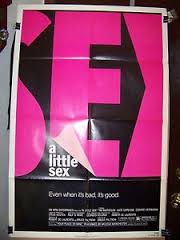
A LITTLE SEX
US, 1982, 94 minutes, Colour.
Tim Matheson, Kate Capshaw, Edward Herrman, Wallace Shawn, John Glover.
Directed by Bruce Paltrow.
A Little Sex is a light comedy drama about love, commitment, sexuality. Tim Matheson and Kate Capshaw are a couple who have lived together - she wanting some commitment, he with a roving eye. Edward Herman is his brother with some wise advice.
The material is predictable enough. However, it is done with light verve, making its points about the key issues.
1.Light comedy, moral fable? The early '80s? American experience? Universal experience?
2.The title, the tone, the irony?
3.New York, the streets, schools and sport, the world of commercials? Authentic flavour? Life in the contemporary city? Musical score?
4.The focus on Michael: his situation, talking to Tom, receiving his advice, the issues of sex and promiscuity? His love for Katherine, the fruit, racing her? The proposal? Trying to be serious, the ring? His plans? Discussions with Tom at the picnic? The problem? The experiment with listing the women? The authenticity - with the comic touch?
5.Katherine, her work in the school, living with Michael for 10 months, sport and work? Her response to his proposal?
6.The wedding, its effect, their ordinary life together? Michael watching the girls? The wager with Tom? His initial failure, at the television station, his being caught by Katherine? His regret, the video story?
7.Katherine and her being hurt, leaving, confronting Michael with the truth, help from Walter, watching the video with the schoolchildren, the night with Walter and being caught?
8.Their discussions together, the possibilities of change, a future, facing the truth?
9.Tommy, his relationship with Michael, his help and advice? The bet? His story about Albert and Duke - and the two forces within Michael? The need for co-ordination and control?
10.Walter and his friendship with Katherine, his apartment, taking Katherine in, the relationship?
11.The various girls, relationships with Michael? The adultery in the television studio?
12.Work, temptations, his boss and his comments about relationships?
13.The video stories, Michael telling the story, learning by them?
14.Mirroring of contemporary society? Moral fable?
Published in Movie Reviews
Published in
Movie Reviews
Tagged under
Saturday, 18 September 2021 19:32
Little Vera
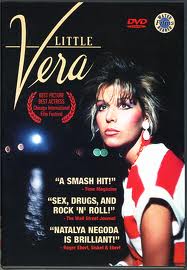
LITTLE VERA
Russia, 1988, 130 minutes, Colour.
Natalia Negoda, Andrei Sokolov.
Directed by Vassili Pitchul.
Little Vera caused some reaction in the West on its release. It is a slice of Russian life, set in a drab suburb of a drab Russian city. The parents, products of the Communist state under Stalin and Khruschev, lead drab lives. However, they have more possessions, are more influenced by the West.
This is particularly the case with their children, the young Victor who is ambitious to be a doctor and find his place in the system, and Vera, the rebel with the punk tinted hair and the tape recorder. The film is also striking in its presentation of the older generation and their drinking, the sexual freedom of the younger generation. The film, apparently, caused some stir with its frankness and nudity in the screenings in the Soviet Union.
The film is reminiscent of many British slices of life, especially such films as Mean Time, directed by Mike Leigh. The film is fairly western in style, shows a slice of life in the Soviet Union - and implies, of course, a strong critique of what has happened in the Soviet Union since the revolution to the '80s.
1.The impact of the film? Interesting? Enjoyable? Soviet style of film-making? In contrast with the period pieces? The Russian way of life, the beginnings of a permissive society?
2.The drab city, the land and seascapes, the houses, the bars, the meagre beach? Musical score and songs?
3.The title, the new generation, the focus on Vera, her life and future?
4.The family background: the apartment, wages and work, education, the younger generation, the influence of the West, the house and its decorations (even posters of Meryl Streep's Still of the Night)? Meals, clothes? The drinking? The product of the Communist state?
5.The portrait of Vera: her offhand manner, her punk tinted hair, clothes, sullen and silent, work on the telephone exchange, her background of studies? Her relationship with her parents, their nagging? Their stating, in anger, that they didn't want her but she would get them a better apartment? Her friendship with Lina, sharing ideas with her? Andrei as her boyfriend? Her love for Sergei, their sexual relationship? The frankness of the portrayal of this relationship? Going home, trying to cope, her father's drinking, getting him to eat, her mother's nagging about cleaning the house? Their ringing Victor for his advice? The sequences with Sergei, Victor's arrival, his banter with Sergei and then discovering her there, his attack? Her story of her pregnancy, her mother's reaction? The plan to marry, going to the official for the licence? At home, the preparation of the meal, Sergei's arrival and treating everybody badly? Her anger? Yet going with him, the love and sex? His coming to live in, the clashes, the picnic at the beach, Victor and his attitudes? Sergei's being bored, his angers? His build-up of antagonism towards the father, putting the father in the toilet, Vera's angry reaction? The stabbing, her hysteria? Her mother giving her advice to explain things to the police? Visiting Sergei in hospital? The pills and the gin, her abandoning all hope? Her being revived? The prospects for her life?
6.The portrait of the parents: their age, life, working in the sewing factory, the truck-driving? Their worries about Vera? The nightly drinking? The bickering? Not understanding Vera, their pride in Victor, calling him in to help solve all the problems? The pregnancy, the plan for the marriage? The fuss for the dinner, Sergei's brutal behaviour? The mother and her wanting everything to be nice? The father and his angers, drinking? The outing at the beach? The complaints about Sergei, yet wanting Vera to marry him? The build-up to the fight, the attack on the father, putting him in the toilet, his breaking the basin? Sergei stabbing him? Their worry, the father going to prison, the police interrogation, the mother and her plans for what Vera would say? The finale in the night, Sergei coming from the hospital, Victor and his arrival (and their seeing him off with the fruit)? The mother's bewilderment, the father and his heart condition, his collapse and lying on the floor? The end of the film?
7.The portrait of Victor, the older brother, his success in Moscow, as a doctor? Coming to fix things up? Friendship with Sergei, yet turning against him? The toasts and the behaviour at the meal? The picnic? His going back and forth to Moscow? The parents seeing him off? His never bringing his wife? His not wanting to lose his job - part of the system?
8.Sergei, the reader, the rebel, his clothes and hair, music, sexual frankness? Love for Vera? The proposal, the plan for the marriage, the story of her pregnancy? His deciding the clothes that he would wear to the dinner, his rude behaviour? His abruptness with the parents, moving in with them, bored? The outings? His build-up of anger, his being stabbed by the father? In hospital, morose, the visits? His decision to leave the hospital, with Victor, wandering around the home? Any coming to his senses or not?
9.The sketch of Lina, the two girls around the town, their youthfulness, western influences, talk about sex? Lina and her meeting the married man in the cafe, the affair with him, decisions, leaving the city? Making the dress for Vera and the wedding? Their friendships, their separation?
10.The detail of life in the Russian city, the ordinariness of home, its appearance, meals, drinking, clothes, etc? The role of the state in controlling people's lives? Relaxation? The lack of values - Communism as an ideal in the head, but not lived up to? The film's comment on Russian society?
Published in Movie Reviews
Published in
Movie Reviews
Tagged under
Saturday, 18 September 2021 19:32
Littlest Rebel, The
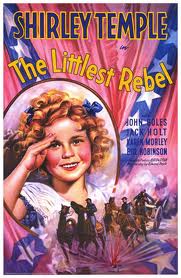
THE LITTLEST REBEL
US, 1935, 70 minutes, Black and white.
Shirley Temple, John Boles, Jack Holt, Karen Morley, Bill Robinson, Guinn Williams, Willie Best, Frank Mc Glynn Snr.
Directed by David Butler.
The Littlest Rebel was one of Shirley Temple's most popular films. With a Civil War setting, it shows a home and plantation in the South, its elegant way of life, the slaves - but with a happy relationship between black and white. However, in the middle of Shirley's party, Fort Sumpter is attacked and the Civil War breaks out. Her father becomes a scout for the Confederates, the Union take over the home and burn it down. This has an adverse effect on the family, especially the mother who becomes ill and dies. An amiable Union officer gives Shirley's father his uniform and a pass to get him through Union lines to Richmond. However, they are recognised and caught. Both are arrested and sentenced to death. Shirley, with her black Uncle Billy, sing and dance in the street and get enough money to go to Washington where they have an interview with President Lincoln. All ends well.
While the film echoes the limitations of black-white relationships even up to the '30s, especially with seemingly patronising presentation of black actors (Bill Robinson as Uncle Billy, Stepin Fetchitt as a bug-eyed servant), the film nevertheless has Shirley in solid relationships with the slaves and the black actors.
Shirley gets the chance to sing and dance with Bill Robinson as well as some songs of her own. She also has some dialogue about war and slaves. And the scene with Abraham Lincoln, Shirley sitting on his knee and their sharing an apple, is a piece of patriotic sentiment. The film was directed by David Butler, director of many comedies and musicals through the '40s and '50s.
1.The popularity in its time of this Shirley Temple film? In later decades?
2.Black and white photography, the atmosphere of the South, the mansion, the countryside? The collage of war sequences? Washington? The musical score, the traditional songs?
3.The title, the focus on Shirley, the South and the Civil War?
4.Virgie and her precocious style, age 6? Her party, the dancing? Love for her parents? For Uncle Billy and for the slaves? The outbreak of the war and its effect? Her father's absence? Her mother's illness? The coming of the Union soldiers, Captain Morrison and the search for her father? Her defiance of him with the slingshot, singing? Her charming him? The brutal soldier and her hiding with the boot polish? His pushing her mother? Her father's return, her mother's death? Her father telling her to think of death as beautiful and the mother going away? His hiding in the roof? Morrison discovering him, the assistance of the uniform and the pass? Virgie going with her father through the lines, recognised, escaping? Her father's imprisonment, her visiting? Her questions about war, friendship with Union children? Uncle Bill, singing and dancing, the money to go to Washington? The interview with Lincoln, explaining the situation? Sharing the apple - fairly? Her return and the happy ending?
5.The Civil War, the slavery issue? The background comments about the futility of war and killing? Slaves and freedom - black slaves not knowing what freedom was? Uncle Billy and Lincoln shaking his hand?
6.The Carey household, the kindly Southerners? The happy black slaves? Participating in festivities in the house? Carey and the Civil War, his uniform, his spying? His return for his wife's illness? Hiding, Morrison helping him, the arrest and imprisonment? Resigned to his fate? The mother, love for her daughter, pushed down the stairs? Her illness and death?
7.Morrison and the Union Soldiers, the brutal soldier and his treatment of Virgie and her mother, his being whipped? Recognising Carey and Virgie? Morrison and his kindness, fairness, imprisoned?
8.Uncle Billy and the black slaves, the young black slave and his digging the hole - and falling in it? The treatment of the black characters - '30s Hollywood style?
9.President Lincoln, genial, the conversation with Virgie? His listening to the situation, carefully asking her questions about her father's behaviour? The sharing of the apple? The patriotic sentiment in this presentation of Lincoln?
10.The popularity of this kind of story in the US of the '30s? Shirley Temple's impact? The raising of social and political themes through the drama, the musical and the comedy?
Published in Movie Reviews
Published in
Movie Reviews
Tagged under
Saturday, 18 September 2021 19:32
Little Girl Lost
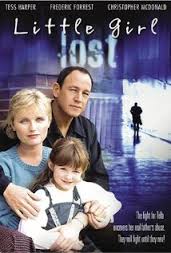
LITTLE GIRL LOST
US, 1987, 97 minutes, Colour.
Tess Harper, Frederic Forest, Sandy Martin, Christopher Mc Donald, Lawrence Pressman, Patricia Kalember.
Directed by Sharron Miller.
Little Girl Lost is an interesting American telemovie, focusing on social and emotional problems. It concerns foster parents (played with great strength by Tess Harper and Frederic Forrest) who have to give up their beloved foster child - whom they may be over-protecting - to her real father. In fact, the father abuses the daughter - and the social workers do not believe the child. The film is strongly emotional in presenting these family scenes. It is also demanding on the audience's emotions when the social workers as well as the judiciary decide in favour of the real father and the child has to go back to him. The repercussions on the child are traumatic.
The film shows ordinary American life, love and affection in the American home. It also shows the limitations of professional social workers and the difficulties of the judiciary to decide justly in such cases.
Worth seeing and discussing.
1.American telemovie? American problems, universal problems? Social environment? Emotions? The courts and justice?
2.The American style of telemovie for the home audience? Adaptation of problems for the widest viewing: families, homes, child abuse, courts?
3.The film based on a true story: legislation, protection, children's rights, parents' rights, parents' duties, the role of social workers, the role of the courts?
4.The picture of Tim and Clara, their loving relationship, family, Kelly growing up and studying, planning to leave home? Their work?
5.Tella and her age, foster child, love, protected? Her tantrums, not wanting to go to her real father, the attitude of the social worker? The question of sexual abuse, Tella's descriptions, the social worker's not believing her?
6.The family, problems, taking Tella to doctors, psychologists, trying to cope, Mrs Young and the social workers?
7.Going to court to claim adoption, the legislation as regards foster parents? The investigations, the dossier? The judge and being caught up in elections? The sympathetic assistants? The hearing, the new judge, both sides, the awarding of Tella to her natural father?
8.Preparation for separation, grief, anger, complying with the court, bewilderment and frustration, keeping her toys in the room for her return?
9.The effect on Tim and Clara? Depression? Avenues of recourse? Lawyers, the advice for the television reporters? Andrea and her interest? Her boss? The pursuit and filming of the programme, the interviews? The effect for Tim and Clara?
10.Andrea, her work, collaboration with Harry, the TV executive and his anger? The playing of the programme? Andrea leaving, the phone call, success?
11.The effect of time, Tella and her growing up, her father's abuse, her new guardian? The decision for the return to Tim and Clara? The changes in her, her shyness, a new beginning, remembering her name, her love for the family?
12.The time indications, the effect on the young girl, her emotions, growing up? Audience insight and judgment on such situations?
Published in Movie Reviews
Published in
Movie Reviews
Tagged under
Saturday, 18 September 2021 19:32
Little Senegal
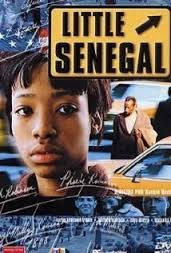
LITTLE SENEGAL
Algeria/Senegal, 2000, 97 minutes, Colour.
Sotigui Kouyate, Sharon Hope.
Directed by Rachid Bouchareb.
Little Senegal was made by the Algerian director Rachid Bouchareb. It focuses on an elderly tourist guide in the slave museum in Senegal. He decides to research his ancestry and discovers that he must go to South Carolina. After work in libraries and archives and visits to properties in South Carolina, he moves to the Little Senegal area in Harlem in New York. He stays with his nephew and his girlfriend. He also finds a young African wanting to get citizenship by marrying the telephonist at the taxi service. His investigations also help him to discover Ida Robinson, a distant cousin. She employs him in her little store near 126th Street and he helps her find her pregnant granddaughter. Love blossoms between the two. She does not understand him well and is not interested in her African background. There are various tragedies along the way and ultimately the old man decides to take the body of his murdered nephew back to Senegal. His search ends where it began but with memories of his American experience and discovery of his relations.
The film is very moving, especially with Sotigui Kouyate very dignified in the central role. Sharon Hope is very strong as the hardened grandmother.
The film raises issues of the African slaves, the transportation to the United States, their being bought at auction, being given new names, their work on the plantations, freedom and the transition to the north. The contrast between life of African Americans in New York City compared with that of Senegal is very strong.
1. The impact of the film? For Africans, for Americans, for other viewers? Particular themes, universal themes?
2. The African settings, the Senegal island and the slave prison? The tour and explanations of what happened in these prisons? The transportation? The contrast with Carolina, the quiet of the towns, the plantations, the libraries? The contrasts with New York City, the streets, the taxi services, work in the street? New Jersey? The musical score? The traditional music, the negro spirituals, the contemporary music?
3. The title and the focus on New York and the old man's experience there?
4. The character of Aloune: his work in Senegal, the painstaking research, the visits in South Carolina and his treatment by white people? Arrival in New York City, relationship with his nephew and with the girlfriend? Living simply in the home? His belief in family and relationships? His going to find Ida, following her, asking her for the job? His persistence? His work for her and her mellowing? The visit of Eileen, his helping Ida to find her, the visit to New Jersey, Eileen's father and his irresponsibility? The relationship between Aloune and Ida? Friendship, love, sexual? The reaction of his nephew? Finding Eileen in the store, bringing her home? Taking her to Hassan's and their looking after her? The irony of her leaving, her friends robbing them and Hassan going to confront them and being murdered? The consequences of Aloune's kindness? His shrewd observation of people, his support of Ida? The death of his nephew, the decision to take him home? The return to Senegal? Memories of New York City? His dreams and his sense of destiny?
5. Hassan and his work in the US, the cabs, fixing the cars, the criticism of the drivers and owners of the cars? His relationship with his girlfriend, not marrying? His brutality towards her? Her love for him, selling the bags on the streets, reaction against him? His worry about his uncle? His refusal to send a taxi when I was pregnant to give birth? His confronting the robbers and his murder? The grief at the funeral?
6. The African wanting citizenship, the relationship with the girl? Money and documents? The sexual encounters? At work? Her falling in love with him? The dependence on Hassan? The interactions, her suspicions? The funeral? His new proposal and the new beginning?
7. Ida, her experience, making a living in New York? Her own daughter and going into the cemetery? Eileen and her story? Her grandmother's concern, harshness? The visit to Little Senegal? Her friendship with Aloune, hard at first, getting him to watch the place? Gradually mellowing? New Jersey, the sexual relationship? His finding Eileen? The reconciliation? The birth, Eileen's unwillingness to hold the baby and the disasters? The decision to look after the baby? The departure of Aloune and her future?
8. Eileen, her story, on the streets, her relationship with her boyfriend, its leading to the pregnancy and her alienation? Her wanting everything her own way? Going to Hassan's place? Continued fights with her grandmother, the clash with Aloune? The water breaking, the birth of the child, her not wanting to hold it? Aloune's persuading her? Her going back to her boyfriend, this leading to the break-in?
9. The streets of New York, harshness, the gangs, violence and robbery, murders? The American heritage for the African Americans?
10. The importance of searching for one's ancestors and knowing one's ancestral story? The contrast with the African Americans and their history, and lack of it in their stories? The enrichment for African Americans of these kind of stories?
Published in Movie Reviews
Published in
Movie Reviews
Tagged under